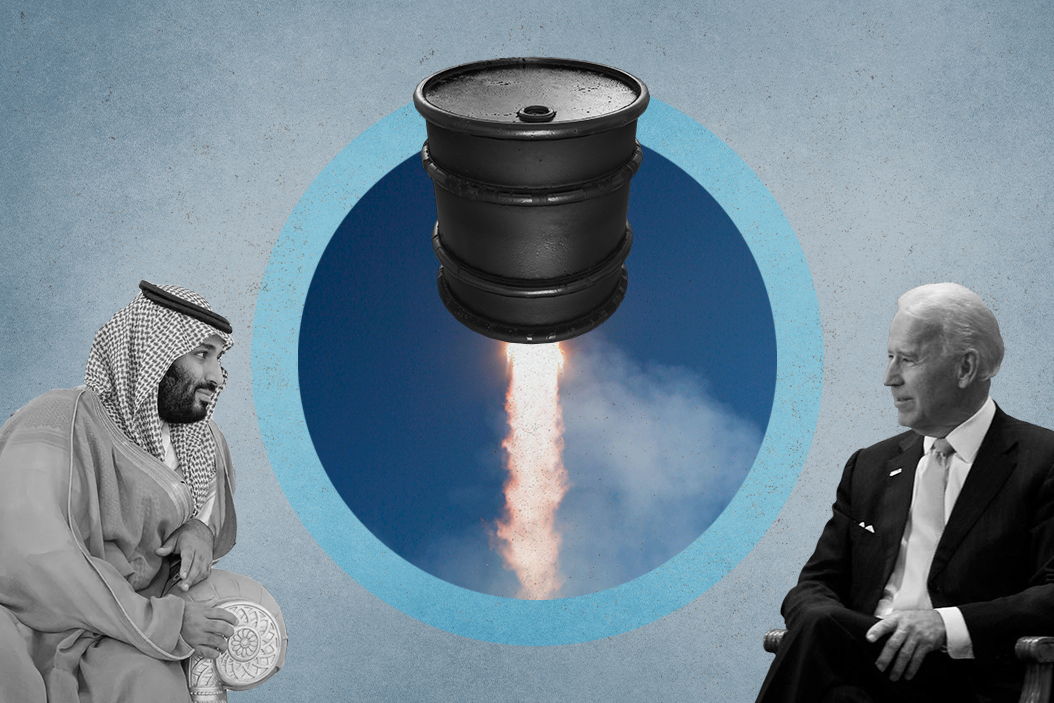June 14, 2022
Bizarre marriages of convenience dominate the geopolitical landscape: Russia and China; Iran and Venezuela; Israel and Turkey. The list goes on.
When President Biden came into office, he said he wouldn’t give a “blank check” to the world’s autocrats, including those associated with longtime US allies.
As part of his human-rights focused foreign policy, Biden rejected any dialogue with Saudi Crown Prince Mohammed bin Salman (MBS), the 36-year-old de facto Saudi leader who’s credited with big reforms like allowing Saudi women to drive. He’s also overseen acts of incredible brutality, including the murder of dissident-journalist Jamal Khashoggi and the scorched-earth military campaign in Yemen.
But two years in and ample crises later, Biden is ready to sit down for a face-to-face with MBS next month in Riyadh. Why the massive about-face?
Liquid gold. The US-Saudi relationship has always been driven by shared interests rather than values. The Saudis, for their part, sit on the world’s second-largest oil reserves and are the world’s second-largest producers of crude. Indeed, in an age where dirty energy still dominates, this gives the Saudis an enormous amount of control over global supply chains, inflation, and economic growth.
“Unlike Lehman Brothers, the US-Saudi relationship was too big to fail,” says Aaron David Miller, a senior fellow and Middle East policy expert at the Carnegie Endowment for International Peace.
As the US became the world’s largest oil producer in recent years – surpassing Russia and Saudi Arabia – a growing perception took hold in many corners of Washington that America would be insulated from global energy shocks, and that global reliance on Middle Eastern oil would significantly wane.
Clearly, Russia’s invasion of Ukraine has thrown that theory on its head. Western sanctions on Russian energy exports have sent oil and gas prices into a tizzy, with US gas prices having recently soared to more than $5 a gallon, a 63% rise from the same time last year. President Biden – who is getting pummeled in the polls ahead of November’s midterm elections – is now pleading with the Saudis to scale up oil production to offset losses from Russia and keep gas prices down.
While Riyadh, the de facto leader of the OPEC producers’ group, has responded to market shocks in the past by increasing oil supply, the Ukraine crisis has made it clear that the Saudis, who have also cultivated ties with Russia, aren't willing to ditch existing oil production quotas. Indeed, they are also sending an implicit message to the Biden administration that it needs to treat its partners better.
What do the Saudis want?
MBS might not be a super sensitive guy, but even alleged murderers have feelings. Simply put: the crown prince “wants an apology,” says Miller, adding that MBS “believes he was wronged” and that the Biden administration “insulted his honor.”
But apart from atonement, there are other tangible things that Riyadh wants from Uncle Sam, including increased security guarantees, particularly as Iran, Riyadh’s arch nemesis, is going rogue on uranium enrichment. (Even though US-Saudi relations were strong during the Trump years, the Saudis were furious that the US barely responded to a 2019 Iranian attack on major Saudi oil facilities.)
While the US certainly is not prepared to be dragged into a war with Iran, Biden is likely willing to “talk [with MBS] about integrated air defense systems not only with Saudi Arabia but also with other Gulf countries,” Miller says.
The indignity of global politics: What will Biden get?
Israel and Saudi Arabia have long been cooperating – surreptitiously – on a host of strategic interests, and there are reports that Riyadh might be willing to formalize that relationship by signing onto the Abraham Accords, which normalized relations between Israel and a host of Arab countries. If nothing else, Biden could cast such a development as a win back home.
What’s more, Biden could use the Saudi meeting to “encourage more movement to solidify the ceasefire in Yemen and lift the Saudi blockade,” that’s preventing humanitarian aid shipments, says Bruce Riedel, a senior fellow and director of the Brookings Intelligence Project. “That will save lives, especially children,” he says. Many Republicans and Democrats would likely get behind such a push.
However, it’s unlikely that Biden will make much progress on the oil front: “The Saudis will do very little to lower oil prices because they are making a fortune,” from the current global energy implosion, Riedel says, adding that they also won’t want to undercut budding relations with Moscow.
Still, Biden will try his best to sweet-talk MBS, a man he once vowed to treat as a “pariah.” But come July, “Biden will be pilloried in the US and accused of hypocrisy,” Riedel says, adding that “if oil prices don’t dramatically fall, which they won’t, he will be seen as a weak failure.”From Your Site Articles
More For You
- YouTube
In this Quick Take, Ian Bremmer addresses the killing of Alex Pretti at a protest in Minneapolis, calling it “a tipping point” in America’s increasingly volatile politics.
Most Popular
- YouTube
Who decides the boundaries for artificial intelligence, and how do governments ensure public trust? Speaking at the 2026 World Economic Forum in Davos, Arancha González Laya, Dean of the Paris School of International Affairs and former Foreign Minister of Spain, emphasized the importance of clear regulations to maintain trust in technology.
- YouTube
Will AI change the balance of power in the world? At the 2026 World Economic Forum in Davos, Ian Bremmer addresses how artificial intelligence could redefine global politics, human behavior, and societal stability.
Ian Bremmer sits down with Finland’s President Alexander Stubb and the IMF’s Kristalina Georgieva on the sidelines of the World Economic Forum to discuss President Trump’s Greenland threats, the state of the global economy, and the future of the transatlantic relationship.
© 2025 GZERO Media. All Rights Reserved | A Eurasia Group media company.
